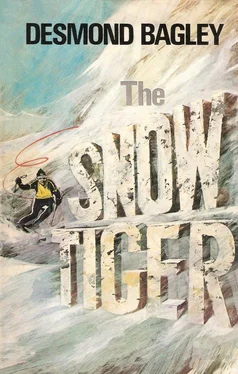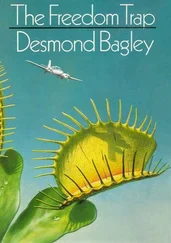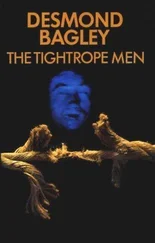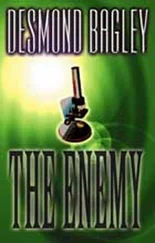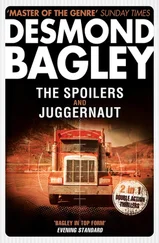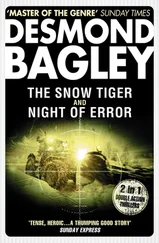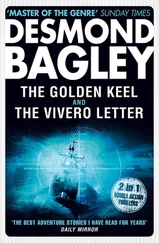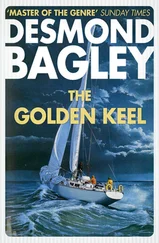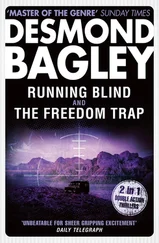Stenning swallowed and his Adam’s apple bobbed up and down in his skinny throat. ‘There was no intention of...’
‘No intention of murder?’ McGill laughed and it was an ugly sound in the quiet night. ‘What the hell else do you expect to happen when you interfere with a maniac like Charlie Peterson?’
Stenning was a lawyer and his mind worked on tracks as precise as a railway engine. ‘I saw Charlie Peterson and Ballard in the hotel tonight. They had a long conversation and it wasn’t amiable — but that’s not proof of anything.’ He turned his head and looked at McGill. ‘Do you know it was Peterson?’
‘Yes,’ said McGill bluntly.
‘How do you know?’
McGill paused. He suddenly realized he was still holding the envelope of photographs. He looked at it for a moment and his mind worked fast. ‘I know,’ he said, lying deliberately. ‘I know because Ian told me before he passed out.’
In the distance a siren wailed as the ambulance approached.
At ten o’clock Harrison walked into the hall and sat on the rostrum flanked by Rolandson and French. He waited until the rustling had stopped, then said, ‘I have to report that Mr Ian Ballard was seriously injured in a car accident in the early hours of this morning and is at present in Princess Margaret Hospital. He is in a coma and Dr McGill is, quite understandably, with him.’
There was a surge of noise. In the Press gallery Dan Edwards frowned, and said, ‘Damn! I wonder if that affects the story?’
‘What story?’ asked Dalwood.
‘Oh, nothing. Just something I was getting a line on.’ He nudged Dalwood. ‘Look at Charlie Peterson. He’s laughing fit to bust a gut.’
Harrison tapped with his gavel to restore order. ‘We are now at a stage of the Inquiry when the evidence of Mr Ballard and Dr McGill is not absolutely essential, so there is no need to adjourn. Call the first witness, Mr Reed.’
Twenty-four hours after the avalanche the number of those still missing had been cut down to twenty-one. All the others had been accounted for — dead and alive. Ballard said glumly, ‘There’s still no sign of Joe Cameron.’
Jesse Rusch said, ‘A friend of yours?’
‘I suppose so. I hadn’t known him long. I don’t suppose there’s much hope for him now, but perhaps it’s better that way. His daughter was killed.’
‘There’ve been too many people killed here,’ said Rusch, thinking of Baker. ‘And some of those deaths were unnecessary.’
‘All of them were,’ said Ballard bleakly.
Turi Buck came up and silently held out a piece of paper. Ballard took it, then looked up. ‘The Marshall family, all four of them?’
‘We’ve just dug out the house — or what’s left of it.’
‘Dead! All of them?’
‘Yes.’ Turi went away, his back bent.
Ballard made four violent slash marks on the list before him. ‘Seventeen.’
‘We’ll be able to get bulldozers in this afternoon,’ said Rusch. ‘That should speed things up.’
‘And it could be dangerous,’ said Ballard. ‘A bulldozer blade could chop a man in half.’
‘We’ll be careful,’ said Rusch. ‘We’ll be real careful. But speed is important now. If anyone buried is still alive now they can’t last much longer.’ By the tone of his voice he doubted if anyone could possibly be still alive.
Cameron was almost totally exhausted. He had been asleep or perhaps unconscious — it did not matter which — but now he was awake again. His whole body was racked with pain and the fierce headache was still with him. He had been sick during the night and had been afraid of choking on his own vomit, but he had managed to twist his head to one side and so had not suffered that particularly ugly death. Also during the night he had uncontrollably voided both urine and faeces and now the stench of himself sickened him.
He became aware of a sound and, at first, thought it was human and his hopes rose. It sounded as though someone was chuckling quietly. Cameron called weakly and then listened as the distant laughter went on. He thought he was going mad — who would be laughing in the middle of a snowdrift?
His senses swam and he passed out for a few minutes. When he awoke again he heard the sound but it had subtly changed. It was now more of a gurgle than a laugh or a chuckle, a sound such as might be made by a contented baby in its cot. After listening for a long time he knew what it was and again became afraid. He was listening to the sound of water.
Presently he was aware that his head was becoming wet. A trickle of water had entered the cab and swirled about his scalp as he hung there suspended upside down, and now he knew that he would drown. Not much water need come in to cover his mouth and nose — no more than six inches.
On the surface two young men were piloting a bulldozer through the hummocky snow alongside the river. The driver was John Skinner, a construction worker from Auckland; he was also a member of the Alpine Sports Club. His companion was a university lecturer and a member of the Canterbury University Ski Club called Roger Halliwell. Skinner stopped the bulldozer by the river, and said, ‘The flooding upstream will stop as soon as the river clears that snow away.’
‘I hear a lot of cattle were drowned,’ said Halliwell.
‘No people, though. That bloody avalanche must have been bad enough without the risk of drowning.’ Skinner looked around. ‘Now where was it that the Yank wanted us to dig?’
A section of snow in the river bed slumped as it was undercut by water and Halliwell looked at it idly. Then he said, ‘I think I saw something down there.’
‘What?’
‘I don’t know. Something dark. It was round.’
‘A boulder, maybe.’
‘Perhaps.’ Halliwell frowned. ‘I’m going to have a look.’
He dropped from the bulldozer and walked to the edge of the river and then put his foot delicately on to the snow. It was soft but bore his weight without him sinking too much. He walked on slowly, lifting each leg high. As he progressed the snow became more slushy because it had been penetrated by the river water, and suddenly he sank up to his waist. He had a nightmare vision of going right down, but he found himself standing on something.
He put his hand down into the snow and encountered a shape which he explored. It was a wheel with a tyre on it. ‘There’s a car in here,’ he yelled.
Skinner jumped down and undipped a wire rope from the rear of the bulldozer. There was a big snap-shackle on each end, one of which he clipped to a stout bar on the bulldozer. ‘Can you catch this?’ He whirled the other end of the rope around his head.
He missed on his first cast, but Halliwell caught it the second time. There was some difficulty in finding somewhere to attach the shackle. Halliwell knew it had to be an integral part of the chassis of the buried vehicle and he groped around in the snow for some time quite unsuccessfully.
In the cab Cameron was close to drowning. The water covered his nose even though he withdrew his head into his shoulders like a tortoise trying to retreat into its shell. There was only a matter of an inch to go before it covered his mouth. While he could do so he took a deep breath.
The truck lurched and water washed over his head. When the movement had finished Cameron’s head was completely under water and he battled to keep his breath. The truck moved again, this time upwards, and Cameron screamed at the pain and thought his back was being broken. The bulldozer hauled the truck bodily from the river bed and on to the bank where it lay on its side.
Halliwell ran up to it. ‘There’s someone in here,’ he said in wonder. ‘And he’s alive, by God!’
Читать дальше
Конец ознакомительного отрывка
Купить книгу
